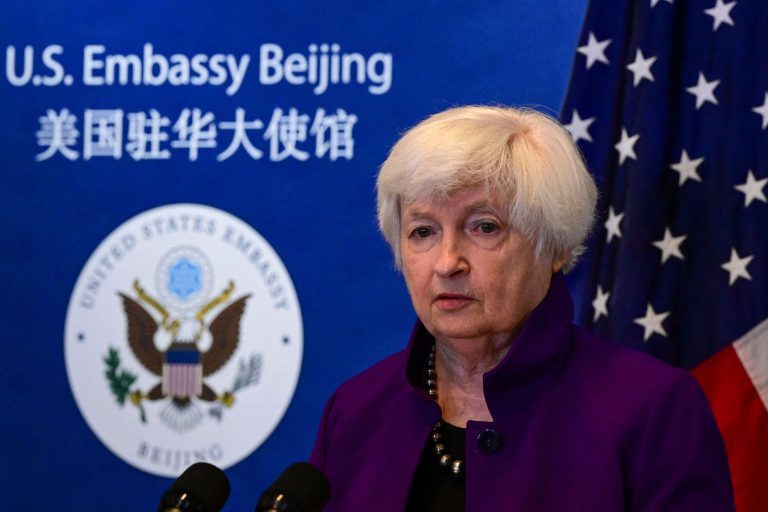News analysis
In her recent four-day trip to China, U.S. Treasury Secretary Janet Yellen spent over 10 hours meeting with senior figures, including People’s Republic of China (PRC) premier Li Qiang and other officials between July 6 and July 9.
In remarks made at a press conference on July 8, Yellen described her conversations with the PRC officials as “direct, substantive, and productive” and clarified that her aim in traveling to Beijing was to “stabilize the relationship, reduce the risk of misunderstanding, and discuss areas of cooperation.”
She further commented that the U.S. does not seek to economically de-couple from China, though Washington’s actions, such as restrictions on semiconductor exports to the PRC, are part of a strategy to diversify American supply chains and take “targeted national security actions.”
MORE STORIES ON CHINA
- Washington Says ‘Spy Balloon’ Made With ‘Commercially Available’ American Technology
- China’s Central Bank to Consolidate Power in Former Deputy Chairman Pan Gongsheng
- High-ranking CCP Official in Guangdong, Li Chunsheng, Sacked for Corruption
“The U.S. and China have significant disagreements,” Yellen said. “But President Biden and I do not see the relationship between the U.S. and China through the frame of great power conflict. We believe that the world is big enough for both of our countries to thrive.”
Success
You are now signed up for our newsletter
Success
Check your email to complete sign up
Official readouts and media reports from both the U.S. and the PRC, however, suggest that Secretary Yellen’s trip yielded no meaningful breakthroughs on contentious issues between both sides, and neither have Sino-U.S. tensions been significantly lowered as a result.
Readouts and messaging
U.S. mainstream media described Yellen’s visit as a welcome effort to mend worsening relations between Washington and Beijing, while Chinese state outlets and official statements used the occasion as an opportunity to advance Communist Party narratives on the bilateral relationship.
During her meetings, Yellen urged the Chinese Communist Party (CCP) to “shift toward a more market-oriented system” that she said would benefit China as well as the U.S. and other countries.
READ MORE
- John Kerry, US Climate Envoy, to Visit China
- China Hiding $3 Trillion in Foreign Currency ‘Shadow Reserves’, Former US Official Says
- Investors Wary of China’s Economy Amid Stagnant Post-Pandemic Recovery and Anticipated Stimulus Measures
Meanwhile, she warned Beijing against allowing Chinese companies to provide “Russia with material support or assistance with sanctions evasion” during the ongoing war with Ukraine.
The CCP, for its part, implied that the U.S. had come to ‘kowtow’ to China in hopes of enlisting its aid — something of “practical need” and the “correct choice” at a time of worsening economic and financial turbulence for America.
A statement published by the PRC Ministry of Finance claimed that the meetings illustrated the “mutually beneficial and win-win nature of Sino-U.S. economic relations.” The finance ministry requested that the U.S. take “concrete actions to respond to China’s major concerns,” including “economic sanctions and suppression.”
These include tariffs introduced by Washington in the Trump administration, the “suppression of Chinese companies,” and “relaxing export controls on China, and canceling the ban on Xinjiang products,” which was imposed in light of outrage over the CCP’s mass internment of the ethnic Uyghurs.
Li Qiang was quoted as stating during his meeting with Yellen that, “China’s development is an opportunity rather than a challenge for the United States. It is rather a benefit than a risk,” according to wire releases from PRC state mouthpiece Xinhua.
In recent months, Western policymakers and think tanks have talked up the concept of “de-risking” as opposed to the more black-and-white “decoupling.”
Notably, Yellen did not use the term “derisking” in her meetings with the Chinese officials.
‘Due responsibilities’
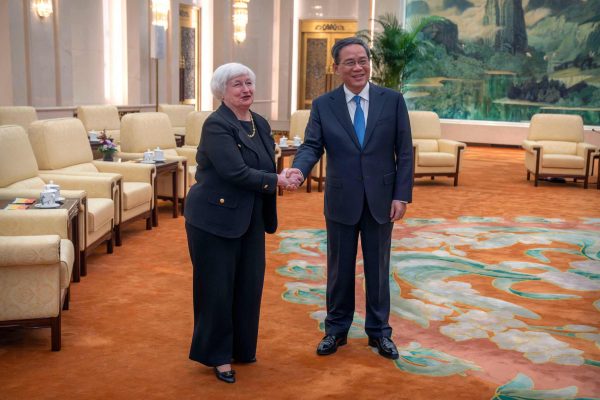
The PRC side framed the relationship between the U.S. and China as that of developed versus “developing” countries, a label that Beijing has long used to wrest benefits out of, but which has come under increasing scrutiny from international observers (China is the world’s second-largest economy and commands a massive industrial base).
In particular, the finance ministry’s statement said the PRC was willing to cooperate with the U.S. in handling global challenges that the Biden administration has made priorities of, including climate change, debt problems, and worldwide financial stability.
At the same time, the statement expressed hope that the U.S. shoulders its “due responsibilities” and “show understanding for and take care of” developing countries, including China.
The text also touted Chinese leader Xi Jinping’s global initiatives for development, security, and civilization as part of the PRC’s plan to meet global challenges and “build a community with a shared future for mankind” — the phrase that has featured heavily in Xi’s official ideology on CCP foreign policy.
Optics
Many observers, including major media outlets, noted that as with the previous visit to Beijing by U.S. Secretary of State Antony Blinken, little substantial results could be gained from the high-level talks between Yellen and her Chinese counterparts, which are shaded by tensions and incidents that echo the Cold War.
For example, Blinken’s visit to Beijing, where he met with Xi Jinping, was originally scheduled for early February, but postponed due to the controversy stirred by a PRC spy balloon discovered floating across the continental United States.
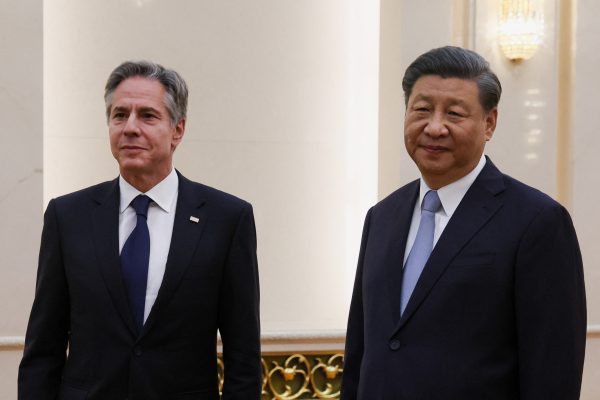
- Mongolian Prime Minister’s China Trip Highlights Growing Economic Dependence on Beijing
- Cisco May Be Sued for Aiding and Abetting CCP’s Persecution of Falun Gong: US Appeals Court
- Why China’s Youth Unemployment Rate May Be Much Worse Than 20%
When Blinken did make his trip, that too was marred by revelations that the CCP had struck a deal with communist Cuba to set up — or was already operating — a signals intelligence base to eavesdrop on the U.S. This was followed up by reports that a Chinese military presence was being established on the Caribbean island nation, which is just 100 miles from mainland Florida at the closest point.
Meanwhile, the diplomatic arrangements afforded to the American top diplomat during his meetings, did not befit his rank, and were unfavorably juxtaposed with the June 2018 meeting between Xi and then-Secretary of State Mike Pompeo.
Early on in Yellen’s visit, video of her emerged showing the treasury secretary bowing rapidly multiple times when being received by Chinese vice-premier He Lifeng. The gesture was roundly mocked and criticized: Chinese netizens noted the self-abasing appearance of the Treasury Secretary and wondered if she thought she was in Japan, where bowing is done much more casually.
“Bowing is not part of the accepted protocol” for U.S. officials, Jerome A. Cohen, an emeritus professor at NYU and Chinese law expert, told the New York Post.
No issues resolved
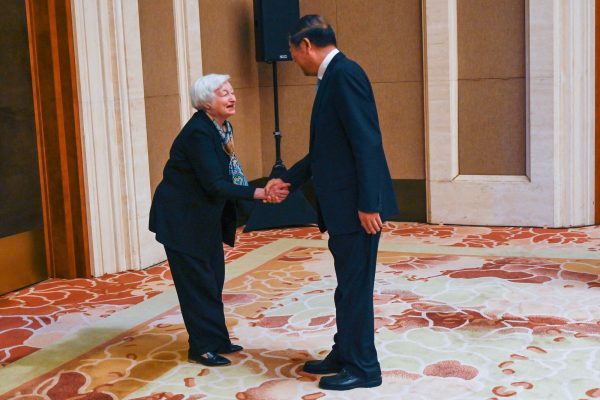
Both Washington and Beijing signaled that neither is keen on raising tensions unnecessarily — at least for the time being — even as they both take measures to shore up national security and safeguard their respective interests.
In an interview with CBS on July 9, the last day of her trip, Yellen said that part of the motivation for the visit was to ensure that “we don’t engage in a series of unintended escalatory actions that will be harmful to our overall economic relationship with one another.”
The U.S. has taken a more hawkish stance on the PRC in recent years as a reaction to the Communist Party’s longstanding flouting of international norms, espionage targeting U.S. industrial and military sector, export of the deadly drug fentanyl to Americans, and other transgressions, as well as massive human rights abuses against the Chinese people.
In contrast to the tone taken by the Trump administration, which explicitly called out and ramped up pressure on the CCP for its Marxist-Leninist philosophy of struggle, Biden officials have preferred to frame the U.S.-China relationship as one of simple competition — and cooperation — between democratic and authoritarian countries.
Despite the more conciliatory gestures made by the Biden administration and the welcoming of talks on both sides, there appears to be little hope for improved relations between the U.S. and the PRC in the near future.
In an article on Yellen’s trip, The New York Times noted that “any suggestion that even one of the many trade, investment and technology issues between the two countries had been resolved” was “conspicuously missing” from the two countries’ official statements on the visit.
Politico, meanwhile, reported that “the major win from Yellen’s visit appeared to be a willingness on the part of both sides to keep talking after years of escalating tensions over trade and security.”
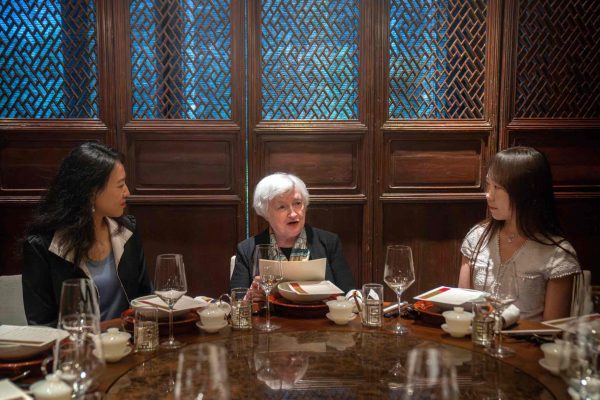
In a July 7 article by Postmedia conglomerate node Financial Post titled “The World Doesn’t Need a China-U.S. Economic War,” author Jack Mintz said Yellen, who was then holding her meetings in Beijing, “might find herself in a Category 3 hurricane as an economic war between the two countries heats up.”
Mintz’s article was centered around a recent batch of “de-risking” economic measures from Washington, such as end-of-June rumors that a total ban on NVIDIA’s high level processors to mainland China would be employed in an effort to curb the regime’s artificial intelligence development.
Forbes also referred to the measures as a “chip war” in a June 5 article that said “China threatens more retaliation” against Washington export controls.
In an apparent tit-for-tat, China tightened export controls on rare earth metals gallium and germanium on July 3.
Chinese leaders, including Xi Jinping, have repeatedly stated their belief that the U.S. is bent on “containing, encircling, and suppressing” Communist China, which has long seen Washington as its primary adversary standing in the way of the CCP’s global ambitions.
While the Yellen visit may not yield much diplomatic fruit, it does signal weakness on the part of the U.S., a perception that can be exploited by the CCP to win propaganda victories and increase its influence among countries that are closely watching the dynamic between China and America.
Vision Times reporter Neil Campbell and SinoInsider, a political risk consultancy specializing in elite Chinese politics, contributed to this report.



